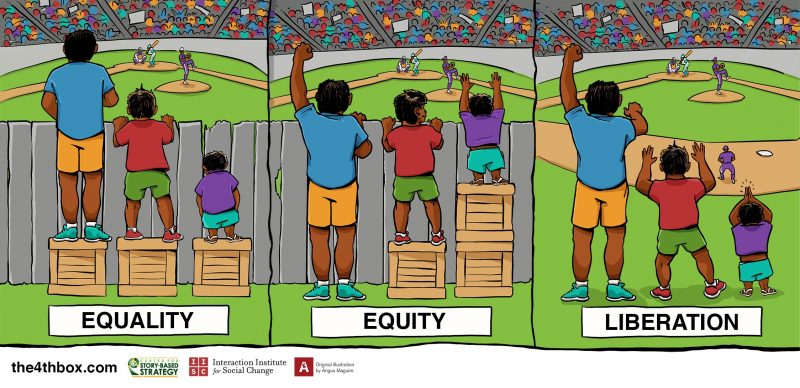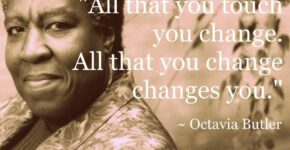Schedule
All materials are available to us for free. Articles and book chapters will be made available on Perusall.
8/23: Why Imagining? What is Equity?
- Octavia Butler. 2005. “The Book of Martha.” Bloodchild and Other Stories. Seven Stories Press.
- Deborah A. Stone. 2011. Policy Paradox: The Art of Political Decision Making, 3rd Edition. Chapter 2: Equity
8/30: What is Equity? Defining Equity in Action
- Anna Brand. 2015. “The Politics of Defining and Building Equity in the Twenty-First Century.” Journal of Planning Education and Research 35: 249-264.
- Melissa Leach, Belinda Reyers, Xuemei Bai, Eduardo S. Brondizio, Christina Cook, Sandra Díaz, Giovana Espindola, Michelle Scobie, Mark Stafford-Smith and Suneetha M Subramanian. 2018. “Equity and Sustainability in the Anthropocene: A Social–Ecological Systems Perspective on Their Intertwined Futures.” Global Sustainability 1: 1-13.
- Kim Stanley Robinson. 2020. The Ministry for the Future. Chapters 11, 16, 20, 30.
In class: Coding scheme creation, Initial team formation
9/6: Problem Definitions and Problem Representations
- Carol Bacchi and Susan Goodwin. 2016. Poststructural Policy Analysis: A Guide to Practice. Palgrave. Chapter 2: Making Politics Visible: The WPR Approach
- W.E.B. DuBois. 1897. “The Strivings of the Negro People.” The Atlantic.
- Daniel Greene. 2021. The Promise of Access: Technology, Inequality, and the Political Economy of Hope. Introduction.
In class: Problem representation exercise
Due: Individual Equity Action Plan coding
9/13: Social Constructions and Policy Framing
- Anne Schneider and Helen Ingram. 1993. “Social Construction of Target Populations: Implications for Politics and Policy.” The American Political Science Review 87(2): 334-347
- Moira O’Neil and Julie Sweetland. 2018. Piecing it together: A framing playbook for affordable housing advocates. Washington, DC: FrameWorks Institute.
- Ursula K. Le Guin. 1973/1975. “The Ones Who Walk Away from Omelas.” The Winds Twelve Quarters. Harper & Row.
In class: Social constructions exercise

9/20: Equity Assessment: Tools and Measurement
- Office of Management and Budget. 2021. Study to Identify Methods to Assess Equity: Report to the President. Pgs 12-48.
- Carlos Martin and Jamal Lewis. 2019. “The State of Equity Measurement: A Review for Energy-Efficiency Programs.” Urban Institute, pgs. 1-34.
- Julie Nelson and Lisa Brooks. 2016. Racial Equity Toolkit: An Opportunity to Operationalize Equity. Government Alliance on Race & Equity.
Due: Team Equity Action Plan Analysis, Friday, 9/23
9/27: Equity Assessment: Evaluation
- Frank Farrow and Sarah Morrison. 2019. “Placing Equity Concerns at the Center of Knowledge Development. Center for the Study of Social Policy.
- Patricia Rogers. 2016. “Understanding and Supporting Equity: Implications of Methodological and Procedural Choices in Equity-Focused Evaluation.” In Evaluation for an Equitable Society, Donaldson and Picciotto (eds.).
- We All Count Blog posts (Heather Krause)
In class: Assessment exercise
In class: team formation
10/4: Reading Day
Due: Individual Policy Assessment pre-brief sketch, Friday, 10/7
10/11: Equity Assessment: Communication and Framing
- Rebecca C. Hetey and Jennifer L. Eberhardt. 2018. “The Numbers Don’t Speak for Themselves: Racial Disparities and the Persistence of Inequality in the Criminal Justice System.” Current Directions in Psychological Science 27: 183–187.
- Allison L. Skinner-Dorkenoo, Apoorva Sarmal, Kasheena G. Rogbeer, Chloe J. Andr ́e, Bhumi Patea, Leah Cha. 2022. “Highlighting COVID-19 Racial Disparities Can Reduce Support for Safety Precautions among White U.S. Residents.” Social Science & Medicine 301: 1-8.
- Miles Corak. 2016. “‘Inequality is the root of social evil,’ or Maybe Not? Two Stories about Inequality and Public Policy.” Canadian Public Policy 42: 367–414.

In class: Communication exericse
10/18: Policy Tools
- Lester Salamon. 2002. The New Governance and the Tools of Public Action: An Introduction. Chapter 1
- Michael Howlett, Ishani Mukherjee, and Jun Jie Woo. 2015. “From Tools to Toolkits in Policy Design Studies: The New Policy Design Orientation Toward Policy Formulation Research.” Policy & Politics 43: 291–311.
In class: Team peer feedback
10/25: Policy Paradigms
- Elizabeth Popp Berman. 2021. Thinking like an Economist: How Efficiency Replaced Equality in U.S. Public Policy. Chapter 1: Thinking Like an Economist
- Lydia DePillis. 2022. “Pace of Climate Change Sends Economists Back to Drawing Board." The New York Times, August 25, 2022.
- Kim Stanley Robinson. 2020. The Ministry for the Future. Chapters 32, 40, 67, 76.
In class: TBD exercise
11/1: Policy Signals
- Pamela Herd and Donald P. Moynihan. 2018. Administrative Burden: Policymaking by Other Means. Russell Sage Foundation. Introduction or Chapter 1.
- Annie Lowrey. 2021. “The Time Tax.” The Atlantic. July 27, 2021.
- Steven Rathgeb Smith and Helen M. Ingram. 2002. “Rethinking Policy Analysis: Citizens, Community, and the Restructuring of Public Services.” The Good Society 11(1): 55-60.
In class: Team presentations
11/8: Election Day
Due: Policy Assessment Brief, Friday, 11/11
11/15: Policy Process and Participation
Cancelled
- Michael Parenti. 1970. “Power and Pluralism: A View from the Bottom.” The Journal of Politics 32(3):501-530.
- Archon Fung. 2002. “Creating Deliberative Publics: Governance After Devolution and Democratic Centralism.” The Good Society 11(1): 66-71.
11/22: Group work day
11/29: Policy Communication and Accountability
- Michael Parenti. 1970. “Power and Pluralism: A View from the Bottom.” The Journal of Politics 32(3):501-530.
- Jerusalem Demsas. 2022. “Community Input is Bad, Actually.” The Atlantic.
12/6: In Conclusion
- Fung, Archon, Hollie Russon Gilman, and Mark Schmitt. 2022. “Strengthening Models of Civic Engagement: Community-Informed Approaches to Inclusive and Equitable Decision-Making.” New America and Ash Center for Democratic Governance and Innovation, Harvard Kennedy School.
- Neil Gaiman. 1990. “A Dream of a Thousand Cats.” The Sandman.
- Franny Choi. 2018. “Introduction to Quantum Theory; a Brief but Spectacular take on Imagining Alternate Realities." PBS NewsHour, Brief but Spectacular.
Due: Policy Communication Example, Tuesday, 12/6
